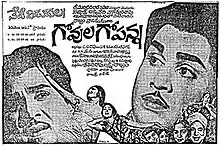| Govula Gopanna | |
|---|---|
 Theatrical release poster | |
| Directed by | C. S. Rao |
| Written by | Bhamidipati Radhakrishna (dialogues) |
| Screenplay by | C. S. Rao |
| Story by | A. K. Velan |
| Based on | Emme Thammanna (1966) |
| Produced by | Lakshmi Rajyam Sridhar Rao Sundarlal Nehata (Presents) |
| Starring | Akkineni Nageswara Rao Rajasree Bharathi |
| Cinematography | Kamal Ghosh |
| Edited by | S. P. S. Veerappa |
| Music by | Ghantasala |
Production company | Rajyam Productions |
Release date |
|
Running time | 160 minutes |
| Country | India |
| Language | Telugu |
Govula Gopanna is a 1968 Indian Telugu-language comedy drama film, produced by Lakshmi Rajyam and Sridhar Rao and directed by C. S. Rao. The film stars Akkineni Nageswara Rao, Rajasree and Bharathi, with music composed by Ghantasala. It is a remake of the 1966 Kannada film Emme Thammanna.[1]
Plot
Gopanna is an innocent cowherd. In the same town, Municipal Chairman Nagaraju a vicious, and undertakes a lot of atrocities and anti-social activities. He has two children, a vainglory daughter Tara, and a warm-hearted son Kasthuri. Once, Tara whips Gopanna's cows, in turn, he strikes her. So, Nagaraju sends his men to eliminate him when Kasthuri rescues him and advises Gopanna to meet Advocate Narasimham by changing his attire. Narasimham is a justice-seeking person who always countermoves against Nagaraju and leads a delightful life with his ideal wife Mahalakshmi. He fixes his daughter Radha's alliance with his childhood friend Sripathi's son Shekar one that resembles Gopanna. By the time, Gopanna reaches their residence they honor him misinterpreting him as Shekar and he falls for Radha. Shekar arrives to apprentice Narasimham and goes into the clutches of Nagaraju. Anyhow, he escapes and reaches Narasimham where he gets surprised to see Gopanna and learns the facts. Right now, they start a confusing drama without revealing their identity. Eventually, Sekhar loves Tara. Hither, Radha fallacies Gopanna witnessing the intimacy of Sekhar & Tara when Shekar affirms the reality. Being cognizant of it, Narasimham necks out Gopanna and decides to nuptial Radha with Shekar he refuses, proclaiming his love affair. At that moment, Narasimham reveals Nagaraju as the homicide of his father Sripathi, who has safeguarded pieces of evidence against Nagaraju in a diary. Listening to it, Shekar breaks down on Nagaraju and gets captivated. Immediately, Narasimham rushes, and Nagaraju seeks to slay him. In time, Gopanna rescues him before Shekar shifts underground. Meanwhile, Gopanna finds the whereabouts of the diary, ceases Nagaraju, and protects Shekar. Finally, the movie ends on a happy note with the marriages of Gopanna & Radha and Shekar & Tara.
Cast
- Akkineni Nageswara Rao as Gopanna and Chandrasekhar[2]
- Rajasree as Tara
- Bharathi as Radha
- Relangi as Pleader Narasimham
- Gummadi as Chairman Nagaraju
- Chalam as Kasthuri
- Suryakantham as Mahalakshmi
- Lakshmirajyam as Shanthamma
- Sukanya as Raji / Rajeswari
- Vangara as Subbaiah
Soundtrack
Music composed by Ghantasala.[3][4]
| Song title | Lyrics | Singers | length |
|---|---|---|---|
| "Hello Mr. Govula Gopanna" | Kosaraju | S. Janaki | 4:15 |
| "Ee Virithotala" | Sri Sri | Ghantasala, P. Susheela,Raghavulu, Bangalore Latha | 3:34 |
| "Akasamlo" | Dasaradhi | Ghantasala, P. Susheela | 3:40 |
| "Kannela Valapula" | Aarudhra | Ghantasala, P. Susheela | 5:29 |
| "Vinara Vinara" | Kosaraju | Ghantasala | 3:59 |
| "Dum Dum Dry Cleaning" | Dasaradhi | Ghantasala, Bangalore Latha | 3:06 |
| "Hadapettakoi Bava" | Kosaraju | S. Janaki | 3:52 |
| "Vinara Vinara" | Kosaraju | Ghantasala, P. Susheela | 2:23 |
References
- ↑ National Film Archive of India [@nfaiofficial] (26 April 2018). "A moment from the dream song sequence 'Kolalanoodhi Kuniva' from the film #EmmeThammanna, starring #FaceOfTheWeek Rajkumar and Bharathi. The film was later remade in Telugu (Govula Gopanna), Tamil (Mattukkara Velan) and Hindi (Jigri Dost)" (Tweet). Retrieved 27 November 2018 – via Twitter.
- ↑ Narasimham, M. L. (19 August 2019). "Remembering 'Dharma Daata' (1970)". The Hindu. Archived from the original on 15 March 2022. Retrieved 21 December 2020.
- ↑ "Govula Gopanna (1968)-Song_Booklet". Indiancine.ma. Archived from the original on 8 December 2022. Retrieved 25 October 2022.
- ↑ "Govula Gopanna". JioSaavn. 31 December 1968. Archived from the original on 25 October 2022. Retrieved 25 October 2022.